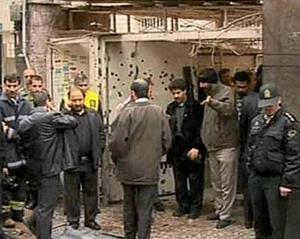Iran's bombIsraeli agents kill yet another senior Iranian nuclear scientist
Israel’s covert campaign to derail Iran’s nuclear weapons program continues unabated; the latest chapter: a senior Iranian nuclear weapons scientists, Majid Shahriari, was killed, and a fellow scientists seriously injured, when two groups of operatives on motorcycles approached their cars on busy Teheran streets and opened fire from automatic weapons; the covert campaign has already claimed more than a dozen leading nuclear scientists and engineers (five of whom killed in Teheran, the others while traveling in Europe), as well as several Revolutionary Guard senior officers associated with the nuclear weapons program; in addition, nuclear weapons-related warehouses and depots, located in Revolutionary Guard military bases, were blown up, and disguised nuclear technology shipments to Iran were seized in ports in Europe, America, and Asia; on 16 November, Iran temporarily shut down its uranium enrichment facilities after the Stuxnet virus, designed by the secretive Unit 8200 of Israel’s Military Intelligence, destroyed hundreds of centrifuges

Officials investigated bombing that killed an Iranian scientist in January, 2010 // Source: telegraph.co.uk
Israel’s covert — well, perhaps not so covert — campaign to derail Iran’s nuclear weapons program continues unabated. The latest chapter: twin blasts in Iran’s capital killed a top nuclear scientist and wounded another yesterday (Monday), with Tehran swiftly blaming the CIA and Mossad for the attacks. The apparently carried out by men on motorcycles. Slain scientist Majid Shahriari and Fereydoon Abbasi Davani, who survived the attack, were senior figures in Iran’s weapons nuclear program.
The attacks came after diplomatic cables that whistleblower Web site WikiLeaks released on Sunday revealed Saudi Arabia’s king “repeatedly” urged Washington to take military action against Tehran’s nuclear program.
Tehran police chief Hossein Sajedi-nia said — mistakenly, we now know — that men on motorcycles attached bombs to the windows of the scientists’ cars in different parts of the capital as they made their way to work. The bombs exploded seconds later. Debka reports that the scientists were attacked not by bmobs attached to their cars, but with automatic weapons.
AFP reports that Iranian leaders accused the United States and Israeli intelligence services, the CIA and Mossad, of killing the two who were also professors at Tehran’s prestigious Shahid Beheshti University.
“One can undoubtedly see the hands of Israel and Western governments in the assassination which unfortunately took place,” President Mahmoud Ahmadinejad told a news conference.
Ahmadinejad’s office said in an earlier statement that “the Zionist regime this time shed the blood of university professor Dr. Majid Shahriari to curb Iran’s progress.”
Interior Minister Mostafa Mohammad Najjar said the “Mossad and the CIA are the enemies of Iranians” whose “desperate terrorist act against the two academics shows their weakness and inferiority.”
Israel’s foreign ministry declined to comment on the reports.
Shahriari was “in charge of one of the great projects” at Iran’s Atomic Energy Agency, the Islamic republic’s nuclear chief, Ali Akbar Salehi was quoted as saying by state news agency IRNA.
He was also a member of the so-called SESAME project on nuclear cooperation in the Middle East.
The other scientist, Abbasi Davani, was targeted by UN Security Council sanctions under Resolution 1747 adopted in March 2007. He was identified as a senior defense ministry and armed forces logistics scientist.
The 52-year-old was “one of the few specialists who can separate isotopes,” and has been a member of the elite Revolutionary Guards since the 1979 Islamic revolution, one report said.
“The two were cooperating with the defense ministry in the field of nuclear research. Shahriari was the head of a project that sought to achieve the technology to design nuclear reactor core,” said the hardline Rajanews Web site.
AFP quotes the police chief to say the assailants had managed to escape and that “nobody had yet claimed responsibility” for the attacks.
In January, Masoud Ali Mohammadi, another Iranian nuclear scientist involved with the SESAME project, was killed in a bomb attack which Tehran blamed on “mercenaries” in the pay of Israel and the United States.
Salehi warned Iran’s enemies they were “playing with fire.”
The latest attacks came a day after the top U.S. military officer said the United States was weighing military options in the face of Tehran’s announcement it had an atomic power plant up and running.
“We’ve actually been thinking about military options for a significant period of time,” Admiral Mike Mullen, chairman of the U.S. joint chiefs of staff said in an interview with CNN.
Mullen said he does not believe that Iran’s nuclear plant is for civilian use “for a second.”
“In fact, the information and intelligence that I’ve seen speak very specifically to the contrary. Iran is still very much on a path to be able to develop nuclear weapons, including weaponizing them, putting them on a missile and being able to use them,” he said.
On Saturday, Iran said its first atomic power plant built by Russia in the southern city of Bushehr had begun operations, ahead of a new round of talks with Western powers over the country’s controversial nuclear drive.
Debka notes that the killing Shahriari will set Iran’s nuclear weapons program back in yet another way: in June he was put in charge of the effort aiming to fight the spread of Stuxnet throughout Iran’s nuclear, military, and industrial sectors. The malware has already infected nearly 40,000 industrial control computers in Iran, and it appears that Israel, having planted the virus, is now targeting scientists responsible for fighting it.
